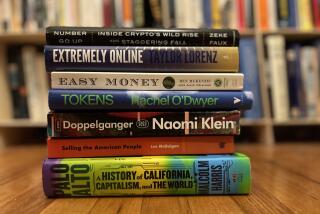Digerati Not Ready for World Without Paper
- Share via
SAN FRANCISCO — Folks on the World Wide Web are apt to disdain the print world, deriding it as painfully slow and old-fashioned.
The reign of the dead tree is over, they chortle via e-mail. The printed page will fade away, we are assured, and all information-sharing will be instantaneous and two-way.
Case in point: HotWired, among the sharpest of all cutting-edge Web sites, which is the offspring of San Francisco-based Wired Ventures Inc., publisher of the online world’s influential Wired magazine.
“HotWired,” says Michael Kinsley of Microsoft’s own Web magazine, Slate. “Don’t they all believe that the medium changes the nature of the message?”
Change it may, but not to anything unrecognizable to a 16th century reader. For earlier this year, Wired launched that tiredest of tired endeavors--a publishing house. For, you know, books.
And not only that, but every digerati worth his silicon is racing to get a book out.
Just some of those already out of the gate include Nicholas Negroponte of MIT’s famed media lab (Knopf), Steven Johnson, editor of the Web magazine Feed (HarperEdge), Hot-Wired columnist Jon Katz (HardWired) and “cyber-pundit” David Shenk (HarperEdge).
So why are all these cyber-brights flocking to one of the oldest media? Someone asked Negroponte, “Mr. Digital Sensibility,” that same question, noted Peter Rutten, publisher of HardWired, Wired’s book division.
“His answer was, ‘Because it’s the interface that my audience has. It’s still the prime interface that people consuming information have.’ ”
“The industry that’s really alive right now, that really has an audience and is profitable, is the book industry,” Rutten said. “Book sales in this country have never been as strong. The interactive industry still has to prove that.”
“The Web is producing more heat than light,” agreed Eamon Dolan, the senior editor at HarperCollins’ new line of cyberish books, HarperEdge.
“The book is an affirmation of a technology that’s been around for 400 years,” he added. “This imprint is not about boosting technology. It’s a very nice hammer, but it’s still a hammer.”
Dolan’s imprint is, however, about grabbing some of the hottest names on the Web and having them sit down to write the kind of 50,000-word treatises no one in his or her right mind would ever read online.
Titles like “What Will Be: Our Lives in the 21st Century” by Michael Dertouzos, with a foreword by a software salesman out of Seattle named Bill Gates. Or “The Soul of Cyberspace” by Jeffrey Zaleski, on the spiritual side of virtual reality.
It’s exactly this question of word count, more than anything else, that frames the debate: long versus short, quick versus slow.
And there are things, everyone digitized is willing to admit, that take longer to say. In fact, now that the dust has settled down some, David Weir, managing director of programming at HotWired, has the most conciliatory words to offer about the print versus wired showdown.
“A good book is something the Web will never compete with,” he said. “This is an environment that fosters the quick, current, impulsive and irreverent. Even explosive fights and conflict. Whereas a book is a chance to thoughtfully organize a great deal of information.”
More to Read
Sign up for our Book Club newsletter
Get the latest news, events and more from the Los Angeles Times Book Club, and help us get L.A. reading and talking.
You may occasionally receive promotional content from the Los Angeles Times.







